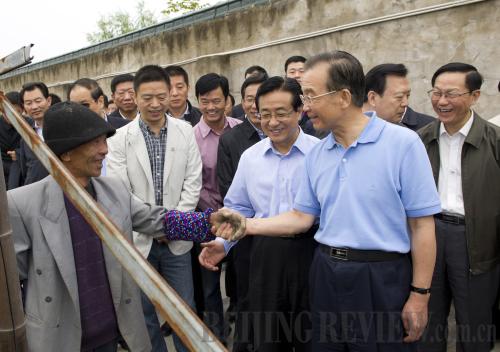|
 |
|
INSPECTION: Chinese Premier Wen Jiaobao chats with a farmer at the Hehu Village of Doumen Town in the city of Shaoxing, east China's Zhejiang Province, on October 3. Wen made surveys of economic operations in rural areas, communities, enterprises and markets during his visits in Zhejiang (XINHUA) |
Good news spread in the city of Wenzhou in east China's Zhejiang Province after National Day on October 1: Policies bailing out the market worked out, banks instilled credit funds, and some bosses who went into hiding due to interrupted cash flow have reappeared.
Since April, dozens of factory owners in the city of Wenzhou have absconded, and at least two bosses committed suicide in the city of Taizhou in Zhejiang, triggered by interrupted cash flow , according to Zhejiang based Qianjiang Evening News. The phenomenon peaked in September and drew wild attention.
Premier Wen Jiabao visited Wenzhou and Shaoxing in Zhejiang on October 3 to 4 to survey economic operations in rural areas, communities, enterprises and markets. Wen urged governments to adopt effective measures to restrain usury, crack down on illegal fund-raising and solve interrupted cash flow problems, so as to prevent the extension of risk into other areas.
On October 12, the State Council, or China's Cabinet, pledged to give stronger support to enterprises with bank credit and tax policies.
The Wenzhou Government sent 25 liaison groups to resolve debt problems for some enterprises. Disappearing bosses, factory shutdowns, and bosses' suicides are basically under control. In the past six months, debt crises in Wenzhou have seen dawn break with the combined efforts by local and central governments, banks and enterprises.
Assistance
The Wenzhou Government issued policies at the end of September urging normalization of financial order and promoting economic transformation, so as to help defuse risks and problems of small businesses.
The 25 liaison groups scattered in 25 commercial banks in Wenzhou survey every small firm and ensure normal loans for small businesses.
Hu Fulin is the president of the Wenzhou-based Center Group, China's largest spectacle manufacturer. He borrowed over 1 billion yuan ($157 million). The Bank of China Wenzhou Branch, the largest creditor of the Center Group, has extended the credit period for the group, offered a preferential interest rate, released 148 million yuan ($23.23 million) of additional fixed asset loans to the group and increased its liquidity funds to 61 million yuan ($9.58 million).
"It is really timely help," Hu told Beijing News. "With the support from the government, private creditors will be relaxed and not force me to repay immediately."
Hu went into hiding on September 22 and returned from the United States on October 9, promising to implement reorganization.
On October 13, the Wenzhou Government set up a 500-million-yuan ($78.49 million) special fund to meet the emergent needs of small businesses, so as to help them to get rid of debt and solve fee and tax problems in future mergers and acquisitions.
To bail out the market, banks in Wenzhou applied for additional loans from their higher headquarters, according to Wenzhou Banking Regulatory Bureau.
Seeking confidence
The package of measures bailing out the market has paid off. Some runaway magnate debtors returned to Wenzhou from abroad.
Sun Fucai, Board Chairman of Aomi Fluid Equipment Co. Ltd., began to work out a plan to reorganize and connect the fractured fund chain upon returning from abroad on October 10.
Hu Fulin endeavored to recover part of its spectacle assembly lines, and hopes to resume all his assembly lines in several months, and will work hard to transform and upgrade his labor-intensive traditional manufacturing.
Resolution
"There are coexistent difficulties in private investment accounting for 110 billion yuan ($17.26 billion), and funding difficulties in 140,000 medium and small-sized enterprises," said Chen Derong, Deputy Governor of Zhejiang, as well as Mayor of Wenzhou. How to resolve this conflict is a key point to promote financial reform in the city, he said.
The main way out to fundamentally prevent from debt crises in Wenzhou is to establish three systems: a financial system serving medium- and small-enterprises; a market system bridging private funds and small businesses; and a financial regulatory system warding off risks, said Chen.
Ma Jinlong, head of Wenzhou Economics Association, said Wenzhou needs to promote financial reform, float deposit and lending rates, and urge formal financial institutions to absorb large amounts of private funds, so as to satisfy small businesses' financing demands.
Xia Baolong, Acting Governor of Zhejiang, told Xinhua that efforts should be made to push privately run and unregistered money lenders to become legal, support enterprises to expand markets, and prevent and solve interrupted cash flow risks of enterprises. | 